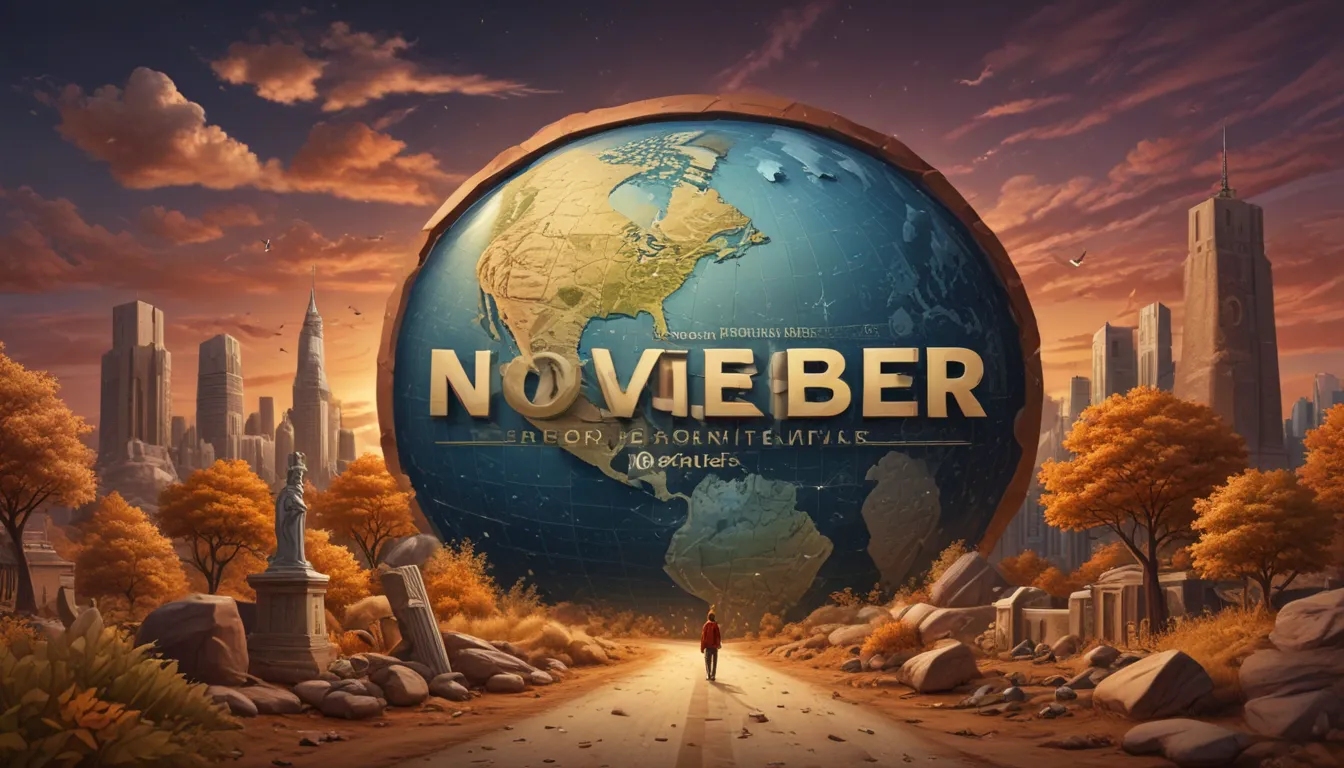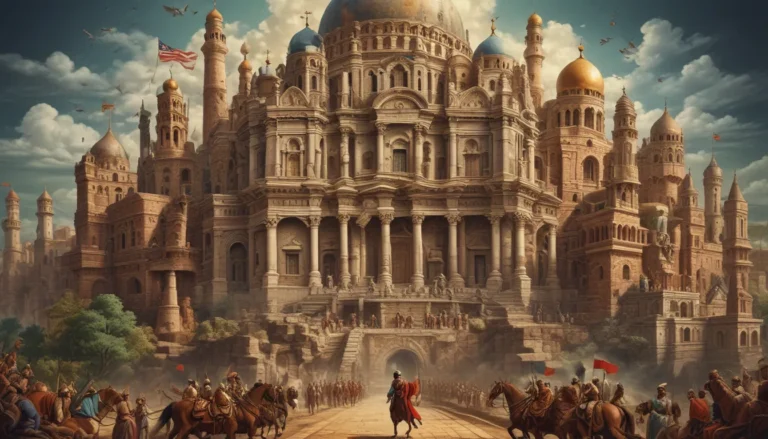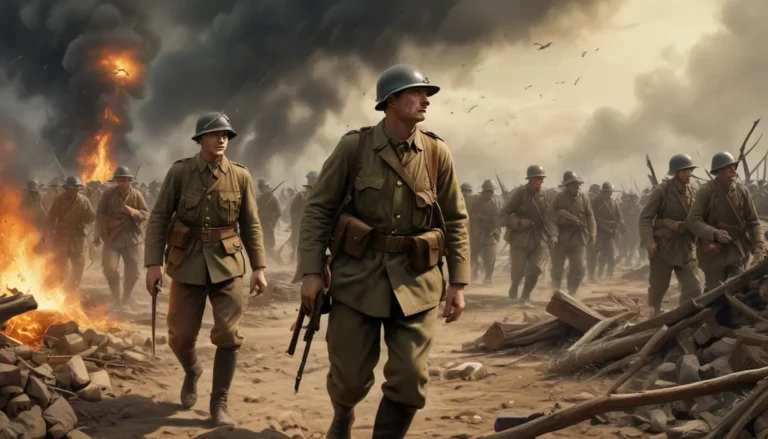The images in our articles may not match the content exactly. They are used to grab your attention, not to show the exact details in the text. The images complement the text but do not replace it.
Welcome to a journey through time, unraveling the fascinating facts and important events that have shaped the world we live in today. November 17th is not just another date on the calendar; it is a day filled with remarkable occurrences that have left a lasting impact on history. From political revolutions to scientific breakthroughs, and cultural milestones to notable births and deaths, this date has witnessed a myriad of significant moments across different eras and continents. Join us as we delve into the intricacies of November 17th and uncover its historical legacy.
Key Takeaways:
- November 17th marks the start of significant events like the opening of the US Congress, the Suez Canal, and the Velvet Revolution. It’s a day filled with political, scientific, and cultural milestones that have shaped history. – From the first successful smallpox vaccination to the premiere of iconic films and albums, November 17th has seen groundbreaking scientific breakthroughs and cultural moments that continue to impact our world today.
Historical Events:
1800: United States Congress Convenes in Washington, D.C.
On November 17th, 1800, the United States Congress held its first session in the newly completed Capitol building in Washington, D.C. This marked a significant moment in American history, as the nation’s lawmakers gathered in the newly established capital to conduct official business.
1869: The Suez Canal Opens for Navigation
A monumental engineering feat, the Suez Canal linking the Mediterranean Sea to the Red Sea officially opened for navigation on November 17th, 1869. This artificial waterway provided a crucial shortcut for maritime trade, connecting Europe and Asia without the need to navigate around Africa.
1917: The Bolshevik Revolution Begins in Russia
On November 17th, 1917, the People’s Commissars took power in Russia, marking the beginning of the Bolshevik Revolution. This event would eventually lead to the formation of the Soviet Union and shape the course of Russian history for decades to come.
1968: Premiere of “Rowan & Martin’s Laugh-In”
A groundbreaking moment in television history, the underground comedy show “Rowan & Martin’s Laugh-In” premiered on NBC on November 17th, 1968. The show’s unique style and humor captivated audiences and became a cultural phenomenon during the late 1960s and early 1970s.
1989: The Velvet Revolution in Czechoslovakia
On November 17th, 1989, the Velvet Revolution began in Czechoslovakia, leading to the peaceful overthrow of the communist regime. This pivotal moment marked the end of decades of totalitarian rule and paved the way for a new era of democracy in the country.
Scientific Breakthroughs:
1796: Dr. Edward Jenner and the Smallpox Vaccination
In 1796, Dr. Edward Jenner performed the first successful smallpox vaccination, a groundbreaking medical achievement that would eventually lead to the eradication of the deadly disease. Jenner’s work revolutionized the field of immunization and saved countless lives.
1922: Niels Bohr Receives Nobel Prize in Physics
Swedish physicist and chemist Niels Bohr was awarded the Nobel Prize in Physics in 1922 for his groundbreaking work on atomic structure. Bohr’s contributions to the field of quantum mechanics revolutionized our understanding of the fundamental building blocks of matter.
1969: First Permanent Artificial Heart Implantation
A major milestone in the field of medicine, the first permanent artificial heart was successfully implanted in a human patient on November 17th, 1969. This groundbreaking procedure paved the way for future advancements in cardiovascular health and organ transplantation.
1989: Petr Hájek Introduces Fuzzy Logic
In 1989, Czech physicist Petr Hájek proposed the theory of fuzzy logic, a novel approach to computer science that revolutionized the field of artificial intelligence. Fuzzy logic introduced a more flexible and human-like way of processing information, leading to significant advancements in computing technology.
2003: NASA’s Mars Exploration Rover Mission
On November 17th, 2003, NASA’s Mars Exploration Rover Mission achieved a major milestone by successfully landing the rover Spirit on the surface of Mars. This historic mission provided valuable insights into the geology and climate of the red planet, expanding our knowledge of the solar system.
Political Milestones:
1558: Elizabeth I Ascends to the Throne of England
In 1558, Elizabeth I ascended to the throne of England, marking the beginning of the Elizabethan era. Elizabeth’s reign was characterized by cultural flourishing, economic growth, and political stability, earning her the title of one of England’s greatest monarchs.
1869: The Suez Canal Opens for Navigation
The opening of the Suez Canal on November 17th, 1869, was not only a significant engineering achievement but also a geopolitical milestone. The canal’s completion facilitated global trade and strategic naval movements, shaping the balance of power in the region.
1970: Soviet Union Lands Luna 17 on the Moon
A pioneering moment in space exploration, the Soviet Union successfully landed the unmanned spacecraft Luna 17 on the moon on November 17th, 1970, carrying the first lunar rover. This achievement demonstrated the USSR’s technological capabilities in the space race.
1993: Approval of NAFTA by US House of Representatives
On November 17th, 1993, the United States House of Representatives approved the North American Free Trade Agreement (NAFTA), a landmark trade deal between the US, Canada, and Mexico. NAFTA aimed to promote economic cooperation and trade liberalization among the member countries.
2006: Retirement of the Last Soviet MiG-21 Fighter Jet
In 2006, the last Soviet-designed MiG-21 fighter jet was retired from active service in the Croatian Air Force, marking the end of an era in military aviation. The MiG-21 had been a symbol of Soviet military prowess and played a significant role in Cold War conflicts.
Cultural Events:
1903: Premiere of Sergei Rachmaninoff’s Piano Concerto No. 2
In 1903, the Russian composer Sergei Rachmaninoff’s Piano Concerto No. 2 premiered in Moscow, captivating audiences with its emotional depth and technical brilliance. The concerto has since become a beloved piece in the classical music repertoire.
1937: World Premiere of “Snow White and the Seven Dwarfs”
Walt Disney’s animated film “Snow White and the Seven Dwarfs” had its world premiere in Hollywood on November 17th, 1937. This groundbreaking film revolutionized the animation industry and established Disney as a powerhouse in the world of entertainment.
1978: Release of “The Clash” Album by The Clash
The self-titled album “The Clash” by the punk rock band The Clash was released on November 17th, 1978, making a lasting impact on the music scene. Known for its raw energy and social commentary, the album became a defining work in the punk rock genre.
1996: 100th Episode of “Friends” Airs
On November 17th, 1996, the 100th episode of the sitcom “Friends” aired, becoming one of the most-watched episodes in TV history. The show’s enduring popularity and cultural impact have made it a beloved classic for audiences around the world.
2013: “Grand Theft Auto V” – Fastest-Selling Entertainment Product
In 2013, the video game “Grand Theft Auto V” became the fastest-selling entertainment product in history, grossing over $1 billion in just three days. The game’s immersive world, engaging gameplay, and cinematic storytelling captivated gamers worldwide.
Births:
1863: Lee De Forest – “Father of Radio”
American inventor and physicist Lee De Forest, known as the “Father of Radio,” was born on November 17th, 1863. His pioneering work in radio technology laid the foundation for modern telecommunications and broadcasting.
1925: Rock Hudson – Iconic Hollywood Actor
American actor Rock Hudson, a heartthrob of the 1950s and 1960s, was born on November 17th, 1925. Hudson’s charm, talent, and memorable film roles made him a beloved figure in Hollywood.
1942: Martin Scorsese – Acclaimed Film Director
On November 17th, 1942, American film director Martin Scorsese was born, known for his iconic movies such as “Taxi Driver” and “Goodfellas.” Scorsese’s innovative storytelling and cinematic style have earned him critical acclaim and numerous awards.
1966: Sophie Marceau – French Actress and Filmmaker
French actress and filmmaker Sophie Marceau, known for her roles in “Braveheart” and the James Bond film “The World Is Not Enough,” was born on November 17th, 1966. Marceau’s talent and beauty have made her a prominent figure in French cinema.
1990: Christopher Paolini – Author of “Eragon”
American author Christopher Paolini, best known for the best-selling fantasy series “Eragon,” was born on November 17th, 1990. Paolini’s captivating storytelling and richly imagined world have enchanted readers of all ages.
Notable Deaths:
1558: Queen Mary I of England
Queen Mary I of England, also known as Mary Tudor, passed away on November 17th, 1558, after a five-year reign characterized by religious turmoil and political upheaval. Mary’s reign was a tumultuous period in English history, marked by persecution and unrest.
1910: Leo Tolstoy – Russian Literary Giant
Renowned Russian writer Leo Tolstoy, author of classic novels such as “War and Peace” and “Anna Karenina,” died on November 17th, 1910, in Astapovo, Russia. Tolstoy’s profound insights into human nature and society have left a lasting legacy in literature.
1978: Margaret Mead – Cultural Anthropologist
American cultural anthropologist Margaret Mead passed away on November 17th, 1978, at the age of 76. Mead’s pioneering research on human societies and cultures shaped the field of anthropology and challenged conventional beliefs about gender and culture.
2003: Arthur Hiller – Film Director
Canadian-American film director Arthur Hiller, known for movies like “Love Story,” died on November 17th, 2003, at the age of 92. Hiller’s contributions to cinema as a director and producer have left an indelible mark on the film industry.
2018: Stan Lee – Co-Creator of Marvel Comics Superheroes
American comic book writer Stan Lee, the co-creator of iconic Marvel Comics superheroes like Spider-Man and Iron Man, passed away on November 17th, 2018, at the age of 95. Lee’s creative genius and imaginative storytelling revolutionized the comic book industry.
Conclusion:
The events that unfolded on November 17th throughout history have shaped the world we live in today, leaving a profound impact on various fields. From political revolutions and scientific advancements to cultural milestones and notable births and deaths, this date holds a rich historical legacy worth exploring. As we reflect on the progress and achievements of humanity over the years, we are reminded of the enduring legacy of November 17th in shaping our past, present, and future.
FAQs:
Q: What are some other notable events that happened today in history?
A: On November 17th, other notable events include the birth of French philosopher and mathematician Blaise Pascal (1623), the groundbreaking ceremony for the Lincoln Memorial in Washington, D.C. (1914), and the release of The Beatles’ album “The White Album” (1968).
Q: Who were some famous individuals born on November 17th?
A: Some famous individuals born on November 17th include American actress Rachel McAdams (1978), British actress Sophie Marceau (1966), and American author Christopher Paolini (1990).
Q: Are there any significant scientific advancements associated with November 17th?
A: Yes, on November 17th, Swedish physicist and chemist Niels Bohr was awarded the Nobel Prize in Physics in 1922 for his work on atomic structure. Additionally, in 2003, NASA’s Mars Exploration Rover Mission successfully landed the rover Spirit on the surface of Mars.
Q: Did any political milestones happen on November 17th?
A: One significant political milestone that occurred on November 17th was the approval of the North American Free Trade Agreement (NAFTA) by the United States House of Representatives in 1993.
Q: Are there any cultural events associated with November 17th?
A: Yes, on November 17th, Walt Disney’s animated film “Snow White and the Seven Dwarfs” had its world premiere in Hollywood in 1937. Additionally, in 1978, The Clash’s self-titled album “The Clash” was released, making a lasting impact on the punk rock genre.
Was this page helpful?
Our commitment to delivering trustworthy and engaging content is at the heart of what we do. Each fact on our site is contributed by real users like you, bringing a wealth of diverse insights and information. To ensure the highest standards of accuracy and reliability, our dedicated editors meticulously review each submission. This process guarantees that the facts we share are not only fascinating but also credible. Trust in our commitment to quality and authenticity as you explore and learn with us.






